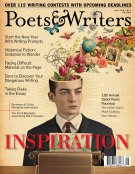Jonathan Fink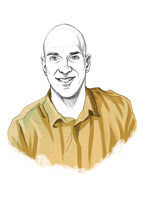
The Crossing
Dzanc Books
“The bodies hang like chimes within the boughs.
Perhaps the height is welcome to the dead”
–from “The Crossing”
How it began: What poetry offers, and what set me off writing this book, is the visceral engagement with language that welcomes attention to imagery, tone, rhythm, narrative, metaphor, politics, ethics, humor, myth, and justice, among many other things. Like a painter who simply likes the smell of paint or a potter who likes the feel of clay, the pleasure of embarking on a writing project, for me, always resides in the tactile pleasures of language.
Inspiration: W. H. Auden has a great line, “Poetry might be defined as the clear expression of mixed feelings,” and I often feel inspired to write about personal, imagined, or historical material about which I have mixed feelings. The poems in The Crossing vary from an eighteen-section poem about the Triangle Shirtwaist Factory fire to individual poems about myth, art, and my personal experience growing up in West Texas. In all cases, I was inspired to write these poems not because I knew what I wanted to say about the subjects, but because I felt compelled to explore and investigate the complicated material through poetry.
Influences: Too many to name, of course, although I would say, of contemporary poets, Jane Kenyon for the singular, resonate image; Marie Howe for book structure and thematic commitment; and B. H. Fairchild for lyrical, narrative expansiveness. I’ve also been immensely fortunate to work with wonderful writing mentors and teachers, including Natasha Trethewey, Mary Karr, George Saunders, Junot Díaz, Brooks Haxton, Michael Burkard, and Robert Flynn—all stunning writers who are unfailingly generous, constructive, and kind.
Writer’s Block Remedy: Raymond Carver defined a writer as someone who is willing to stare at something longer than anyone else. For me, that experience has been true; there is no trick to overcoming a writing impasse other than continuing to return to what I’ve written, looking for unexplored possibilities and/or unfulfilled expectations.
Advice: Submit to your obsessions, whatever they are. Resistance is futile. An honestly obsessive collection always resonates much more fully with a reader or editor than a collection constructed with an eye toward the market or some imagined palatable consensus. Remember that a camel is a horse designed by a committee.
What’s next: Dzanc is bringing out a finished second collection of my poetry, a book-length sonnet sequence titled, “Barbarossa: The German Invasion of the Soviet Union and the Siege of Leningrad.” I’m also nearing completion of a nonfiction collection primarily consisting of place-based immersive and investigative essays. Some topics include the fracking boom in Midland, Texas; the D. B. Cooper plane hijacking and parachute jump; the changing scope of U.S.–Cuba relations; and the failings and successes of the criminal justice system as seen through the lens of an assault trial in Pensacola, Florida; among other essays. I’m also working on new individual poems.
Age: 40.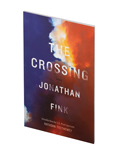
Hometown: Abilene, Texas.
Residence: Pensacola, Florida.
Job: Associate professor and director of creative writing at the University of West Florida.
Does your job allow time to write? Yes, in the sense that my job contributes to the conditions that help make writing possible, but no job has ever prevented me from writing if I felt compelled to write.
Time spent writing the book: Approximately six years.
Time spent finding a home for it: Another six years after finishing and publishing the individual poems.
Three favorite words: Yes. No. Maybe.
Jonathan Fink reads from The Crossing, published by Dzanc Books.
***
Rickey Laurentiis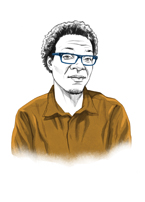
Boy With Thorn
University of Pittsburgh Press (Cave Canem Poetry Prize)
“I want to be released from it.
I want its impulses stunned to lead.
This body. Its breath.
Let it. Let the whole pageant
end.”
–from “One Country”
How it began: I think about a friend and fellow poet, Phillip B. Williams, with whom I shared a suite at my first Cave Canem retreat in the summer of 2008. He had a manuscript then (actually several), but wouldn’t share it with me to read until I had something manuscript-length to share with him. So, that’s what I think Cave Canem must mean by fellowship: that kind of camaraderie, support, and push, however hard. I eventually did produce a manuscript and shared it with Phillip, but it was one very different in many ways from the Boy With Thorn that would eventually find publication. We helped shaped each other’s books along through the many years, but more importantly we helped compel each other’s poems. Poems first.
Inspiration: I’m likely to be inspired by anything in the right context: an overheard conversation on the street, a song, literary criticism, philosophy, a personal experience or, as is most present in my book, visual art. I was profoundly influenced and inspired by a course I took while at Sarah Lawrence College—queer theory, with Julie Abraham. That course threw a hammer into my ways of thinking. And not because it attempted to rebuild the pieces (although, in some ways, it did), but because it made me more aware of the pieces themselves and the various social/political discourses that have shaped them.
Influences: Here are some artists: Glenn Ligon, Jean-Michel Basquiat, Björk, Piero della Francesca, Wangechi Mutu, Georgia O’Keeffe, David Bailly, Kara Walker, Edgar Degas, Judy Chicago, Yoko Ono, Jay DeFeo, Caravaggio, Auguste Rodin, Romare Bearden, Frida Kahlo, Anonymous. And I remain deeply influenced, in particular, by Jessye Norman's rendition of “Deep River,” which she sung at a special concert with Kathleen Battle at Carnegie Hall in 1990 and most of which you can find recorded on YouTube.
Writer’s Block Remedy: My obsessions keep me going. I think about visual art and how, in the example of an artist like Mark Rothko, who explores the same terrain canvas after canvas, or at least seems to, I learned to recognize and trust my obsessions: the images, concepts, figures, and motifs that repeat in my head. Obsessions are ideas that I can at least remember are there at those anxious moments I’m willing to believe in a thing like “writer’s block.” But writer’s block, simply speaking, doesn’t exist if one’s willing to look back at all one has done and, realizing knowledge is always limited, thinks, “Nope, I need to try this again.” I still believe that.
Writing Prompt: Outside of what I offer to my students, I’m not sure I think about writing in terms of prompts, at least not thematic ones. If I chose any, they’re usually prompts that put restraints on the form or structure of the poem. A part of me vaguely remembers diagramming sentences as a young Catholic school student and so, in some ways, that finds itself in the pleasure I get from trying to sustain a single sentence over the course of a poem, or at least over several lines. There’s something about that exercise that seems dancerly to me, rhythmic.
Advice: So, there are thirty-three poems in my book—but that doesn’t mean I only wrote thirty-three poems. Of course I wrote way more than that at various stages in my growth and education as a poet—some that made the cut; some that I realize were the equivalent of a pianist practicing her scales; some that only exist as a single ghost line in another poem; some that might eventually find a home in a future collection, who knows. My point is to say that the process takes time, so much time, and, while I’m a fan of putting artificial restraints on a poem so as to get to more creative uses of language, I’m not a fan of artificial time restraints on publication. Just as I think that there’s something potentially problematic in knowing too much about what a poem is about when starting, so too I think there’s a problem in trying to know or demand when you should publish a book. Let the book tell you. And when it does send only to places that carry books you can’t live without.
What’s next: What they don’t tell you is that the second your first book is accepted for publication at a press (or wins a contest), let alone when it is physically published and released, all the poems you begin to write suddenly sound in a slightly different key, so to speak. The poems are suddenly working under the slight burden of knowledge that they may one day become (or that you need them to become) a second (or third or fourth) book. I am working hard now to try to get back to the kind of specific ignorance one writes from before the first book gets published: when you’re simply writing poem by poem because of some insistence that you have to; this poem must be written, alone, individual, not as a sequence necessarily, not because of some “theme” or “project,” but simply because it demands itself to be written, and for you to write and learn by it.
Age: 26.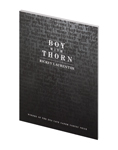
Hometown: New Orleans.
Residence: New York City.
Job: Currently, I teach a course at Columbia University and at the Saturday Program at the Cooper Union. I’m also the director of an after-school writing and literacy program at the Harlem Children’s Zone.
Does your job allow time to write? No—but that’s a good thing. When I’ve been fortunate enough to be invited to some residencies, for instance, I’ve found that the sudden surplus of free, unstructured time can do harm to my writing process, insofar as I begin to occupy my time in other ways besides writing new work. Residences are great for editing older drafts or for ordering a book. But it’s in the gaps, in the minutes I steal when I’m on a crowded subway, when I’m in a less-than-exciting meeting or when I should be asleep, for example, that I find myself writing the most new material.
Time spent writing the book: The earliest poem in the book I wrote as a first-year at Sarah Lawrence College for a class (my first poetry class ever!) with Suzanne Gardinier. That was in the fall of 2007. The last poem I wrote that was also included in the book was written somewhere in late January/early February of 2014, after having seen one of my favorite Basquiat paintings in the flesh in a exhibit in New Orleans earlier that Christmas. So it would seem, then, that it took seven years to write all thirty-three poems that comprise Boy With Thorn (it took two years, alone, to complete one in particular). I was born on February 7. Seven’s always been my favorite number.
Time spent finding a home for it: Maybe about a year after Phillip first brought the idea to my mind that I could write toward a manuscript, I sent it out to a handful of contests. To my surprise, the manuscript was honorably mentioned for Red Hen Press’s Benjamin Saltman Poetry Award and was a finalist for the National Poetry Series. But I’ll remind you that this manuscript I’m referring to was, in significant ways, still very different from the book I would come to publish. After that, somehow, and quite suddenly, I wasn’t interested so much in rushing towards book publication. I concerned myself with the quality of the poems themselves, and with seeing them enter the world individually. So there was a large gulf of time when I didn’t submit a single manuscript to any contest or publisher, which mostly paralleled my graduation from Sarah Lawrence and matriculation into the MFA program at Washington University in St. Louis. A year after I had received my MFA and had moved back to New York City, I sent my new manuscript to at least two publishers and four contests—four specific contests that either had a history of awarding books I admire or were being judged by poets I greatly enjoy. I didn’t get as much as a nod from three of them but, again to my surprise, I won one! And that it was the Cave Canem Prize just seemed so coming-full-circle perfect! Anyway, depending on how you read this narrative, you can say it took several years to find a publisher, or only a few months.
Three favorite words: Womb, whom. Dark.
Rickey Laurentiis reads two poems from Boy With Thorn, published by University of Pittsburgh Press.
***
Natalie Scenters-Zapico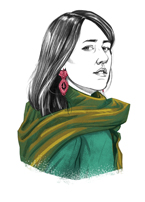
The Verging Cities
Center for Literary Publishing
“You forgot to weed your eyes, so brush
has grown wild in your stare.”
–from “When the Desert Made Us Visible”
How it began: Homesickness. I wrote most of these poems while I was living in Albuquerque, New Mexico. I felt deeply haunted by things in my past that I had spent a lot of time ignoring: femicide, narco-violence, and the effect our broken immigration system had on me and the people around me. Suddenly, I felt compelled to face these things in a way I had never had an interest in before. For some reason, being away from the site of my liminality gave me the bravery to voice what had been silenced in me for so long. I also became very interested in the ways that people who are not from El Paso–Juárez were representing my border cities in art and pop culture. I wanted to write down my love affair with a place so often depicted as violent and corrupt.
Inspiration: The drive from Albuquerque to El Paso, Texas, and from Ciudad Juárez to Chihuahua was a huge source of inspiration. I would also drive the border freeway and take in that space, that in-between space, that illusion that is so physically damaging. And, of course, late-night conversations with my husband who is a border-rhetorics scholar, and who for most of our relationship was undocumented. When we fell in love, we also fell in love with each other’s pain, and the two cities that held us suspended in that pain.
Influences: While working on the collection: David Dorado Romo’s Ringside Seat to a Revolution, Gloria Anzaldúa’s Borderlands/La Frontera, Norma Elia Cantú’s Canícula, Alejandro Morales’s The Rag Doll Plagues, and Roberto Bolaño’s 2666 spent a lot of time on my desk. These books deeply influenced the way that I conceive of borders and of my sister cities, El Paso–Ciudad Juárez. I also spent time with Federico García Lorca, Miguel Hernández, Anna Kamieńska’s notebooks, Voltaire’s Philosophical Dictionary, Rigoberto González, Alberto Ríos, and Benjamin Alire Sáenz.
Writer’s Block Remedy: I cook something that takes a while to make, but that I know how to make well. The repetitive motions of cooking keep me grounded in the body, but allow me the freedom to let my mind wander. I also like knowing that many women before me spent so much time in that domestic space, and I remind myself how important it is that I choose to be there, but that I don’t have to be there.
Writing Prompt: I spend a lot of time looking at the art books for the Bienal Ciudad Juárez–El Paso art shows, and then writing ekphrastic poems or flash fictions. It keeps me connected to where I’m from while helping me to see the border in new ways.
Advice: It is as important to know what you’re trying to accomplish in your collection as it is to know what it actually accomplishes. Sometimes placing your own will on a collection is the worst thing you can do.
What’s next: I’m in the early stages of working on the next book, which deals with border-security technologies, surveillance, and weapons. I’m interested in depictions of violence, how we consume that violence, and render that violence in art.
Age: 27.
Hometown: El Paso, Texas.
Residence: Salt Lake City.
Job: I teach high school English and creative writing.
Does your job allow time to write? It is always a struggle for me to write as a high school teacher. I have to schedule time for me to physically sit at my desk and write.
Time spent writing the book: It took me four years of obsessively writing and revising in constant rotation.
Time spent finding a home for it: One year.
Three favorite words: Sobremesa, cariño, and teeth.
Natalie Scenters-Zapico reads from The Verging Cities, published by The Center for Literary Publishing.
***
Corina Copp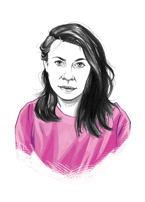
The Green Ray
Ugly Duckling Presse
“Let rest here my lyre and
Hear soon the moon’s fair
Lecture in black”
–from “Pro Magenta”
How it began: I was reading Mark Ford’s biography of Raymond Roussel when I first came across mention of the green ray. In the same month, I saw Éric Rohmer’s Le rayon vert, and I attended a François Laruelle lecture. The notes from all three came to be the poem “Pro Magenta,” which set me into thinking about synchronicity and how I compose. The wheels of the actual manuscript were put into motion a few years later, when Ugly Duckling Presse editor Abraham Adams proposed a book project.
Inspiration: These poems range in composition date from 2010 to 2015, so what resonates now as far as inspiration goes is a list that I’ll spare you—but they are distinct, and each poem holds one or another source (or many simultaneously) in (I hope) different ways. Jean Day’s Enthusiasm: Odes & Otium was formative for me when thinking about devotion and source materials and how to think and write alongside inspiration itself, to construe it as an interlocutor, or a threat, or a friend, or a fetish, etc.
Influences: When I first started seriously writing poetry, I was reading Mina Loy, Djuna Barnes, Laura Riding Jackson; and I was obsessed with Alice Notley and Carla Harryman. Then Miles Champion introduced me to Tom Raworth and Jean Day—they both had a big impact. I had another turn when I really read Lisa Robertson, who led me to read Hannah Arendt. Richard Maxwell, the playwright, was another turning point; and the work of Big Dance Theater, Thomas Bradshaw, Kristen Kosmas. For a few years now, Ingeborg Bachmann, Marguerite Duras. And my friends are influential. They’re all brilliant. Can I say brilliant?
Writer’s Block Remedy: I’m easily comforted and astonished. By that turn from feeling like New York City’s rag doll, in particular; from that real desire to leave my life and start a new one; from that exhaustion; from walking into a diner or taking a train. I have to be in that place to write; I have to have a connection to future good feeling in general if I expect myself to write. Also: film and bibliomancy, both. Or Robert Ashley, an example. Opening to pages/sounds/images of work that I love will always help. Going to the library, feeling overwhelmed. But I can go for months without writing; I am often waiting to feel angry, or any emotional event, or just a deadline to push me. But accepting the stretches of not writing is okay, too. I mean: If I feel alert and awake and thoughtful and without remorse, then I am listening, which for me is also writing. I compulsively transcribe overheard dialogue or I note exchanges between people or how they are physically positioned. If I’ve gone months without this sort of openness, then I’m probably depressed and not writing. To help me accept that, I remember something Doris Lessing said—to paraphrase, you must use these energies while you have them, you will lose them; you are more clever now than you will be later. Terrifying.
Writing Prompt: Feeling constrained.
Advice: I took a strange route, and had faith I’d eventually get to work with people who cared about the poems. Having faith in those relationships is important.
What’s next: I’m working on an essay/score that reads and writes through the reading of the painter Alan Reid. The piece will appear in a monograph of his work that should be out in the spring.
Age: 36.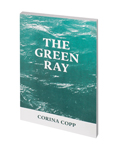
Hometown: I was born in Lawrence, Kansas, and grew up in Boulder, Colorado, and New Orleans.
Residence: New York City.
Job: I usually have two to three part-time jobs. I am currently a staff writer for the Poetry Foundation, I freelance copyedit and proofread, and I coordinate a master’s program in international finance and economic policy at Columbia University.
Does your job allow time to write? I’ve made it this far. But the answer is no, not at all. I would always prefer to be writing, to put it gently.
Time spent writing the book: About four or five years.
Time spent finding a home for it: I was very, very lucky in that Ugly Duckling approached me for the book. This was initially around 2012 or 2013, but I still had to finish writing it. We changed the date of publication a few times. They were patient with me.
Three favorite words: “Mom” and “or” and “Dad.”
Corina Copp reads an early version of her poems from The Green Ray, published by Ugly Duckling Presse, for the sixth Antibody Series in 2014.
***
Morgan Parker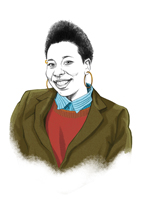
Other People’s Comfort Keeps Me Up At Night
Switchback Books (Gatewood Prize)
“If I hear you’re talking shit about me
in your confessional interview,
please know
seven birds have fallen dead at my feet
right out of the sky.”
–from “If My Housemate Fucks With Me I Would Get So Real (Audition Tape Take 1)”
How it began: This book started as my MFA thesis at NYU. It was embarrassingly large—something like 120 pages—so I spent the summer after graduation editing it, reordering it, and trimming it down in preparation for sending it out to contests and presses. The first book is a weird thing—mine contains some of the first poems I ever wrote, back in college. Of course, when I was writing those, I had no idea I was writing a book. I was playing around with new forms and registers and confessions, and it was only in grad school that I started thinking about the poems as a collection. There isn’t a “project” in this book, there isn’t a linear narrative or one central event, so in conceptualizing the book, I spent a lot of time thinking about my obsessions, taking in a lot of art and TV and movies and music and poems, and meditating on the themes they have in common.
Inspiration: Television. The Real World and The Real Housewives franchises have been particularly inspirational for me—something about the strangeness and boldness of reality TV, its dark comedy, is a really important lens in my work. Jay Z and Beyoncé are also super important figures in my work—or rather, symbols of them, the idea of them. In general, media and pop culture always have a lot of space in my poetic brain. They’ve got everything I want to talk about: loneliness, performance, representations of femininity, insecurity, family, sociocultural inequity, glitter.
Influences: My collaborator Angel Nafis; my peers Danez Smith, Charif Shanahan, Nate Marshall, Natalie Eilbert, Rio Cortez, Monica McClure, Wendy Xu (I could go on forever here); my big brother Matthew Rohrer; my poetry auntie Eileen Myles; Terrance Hayes, Tracy K. Smith, Evie Shockley, Matthew Zapruder, Cate Marvin, Anne Sexton, Lucille Clifton, Allen Ginsberg, Langston Hughes; visual artists Mickalene Thomas, Carrie Mae Weems, Keith Haring, Glenn Ligon, Kameelah Janan Rasheed, William Pope.L.
Writer’s Block Remedy: If I feel stuck, I stop writing for a while. Or I write in another genre for a bit. I read. I go look at art. I have good conversation with friends over wine. Lately I’ve been trying to honor silence rather than being anxious about it. The itchy, restless feeling always comes back; the poems always emerge. I’m realizing more and more that “writing” is only a tiny aspect of writing poetry.
Writing Prompt: Formal poetry. Specifically sonnets and pantoums. Usually, I edit the drafts until they’re unrecognizable as formal poems, but constraint really helps my writing process. Honestly, I see prompts as rules to break, something to rebel against.
Advice: Submit widely, but also be strategic and thoughtful: Don’t submit to a press you aren’t familiar with or whose work you don’t love; don’t submit to a press whose aesthetic isn’t up your alley. A press is really a home for a book—and for you, the poet, as well—so I think it’s important (and often neglected in conversation) to remember the relationship continues past manuscript acceptance. It’s an intimate thing. Also, know that as you’re submitting, you should keep editing. Don’t be so stubborn you can’t see room for improvement. Finally, make the waiting time productive. Write new poems, go to readings, meet new writers, build community.
What’s next: I’m editing my second collection, There Are More Beautiful Things Than Beyoncé, and getting it ready for publication with Tin House Books in 2017. I’m also at work on a young adult novel loosely based on my teen years spent coming to terms with my identity and depression in a conservative, religious suburb—it’s my first foray into fiction, and an exciting challenge. There’s also a rumor floating around that there may be an essay collection in my future.
Age: 28.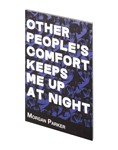
Hometown: Highland, California.
Residence: New York City.
Job: Editor for Little A Books and Day One, adjunct assistant professor of undergraduate creative writing at Columbia University.
Does your job allow time to write? Sometimes. I write at night, on the weekends, and in transit (buses, trains, planes). I wish I were one of those people who could wake up and write before work, but I’m a snooze-button person. Ideally, I block out a day each weekend to write or edit. I’ve also been known to take vacation days to hole away uninterrupted.
Time spent writing the book: They were written and edited over the course of five years.
Time spent finding a home for it: A year.
Three favorite words: “There’s free wine.”
Morgan Parker reads two poems from Other People's Comfort Keeps Me Up At Night, published by Switchback Books.
***
Richie Hofmann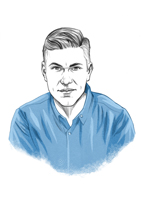
Second Empire
Alice James Books (Beatrice Hawley Award)
“I have nothing
to confess. I don’t yet know that I possess
a body built for love.”
–from “Idyll”
How it began: I began writing the first poems in this book while I was working on the book collection at the James Merrill House in Stonington, Connecticut—a magical, haunted place full of Merrill’s things, his furniture, his books. It was inspiring to inhabit that physical space with the spirit of someone whose art had meant the world to me. His “The Book of Ephraim” was one of the first contemporary poems I loved. To be showering in his shower, sleeping in his bed, staring into that mirror. There, among his art and belongings, my desire to write poetry was given new dramatic force.
Inspiration: Love; sexuality; history; music, especially opera and art song.
Influences: My teachers, foremost. Jorie Graham’s Erosion. Benjamin Britten’s operas and song cycles. Daniel Mendelsohn’s essays. French and Italian poetry in translation. Stephen Sondheim lyrics. Installations by Félix González-Torres.
Writer’s Block Remedy: Sometimes it’s important for me to get outside of poetry, or outside of literature altogether. To listen to music, look at a painting or sculpture or installation, see a concert, attend a lecture on something strange but intriguing. These other arts not only provoke new subjects, but they might offer new ways of thinking formally as well.
Writing Prompt: Write a poem in which your own name is invoked and explored.
Advice: Cut almost everything. Make your book as lean and dynamic as possible. Give yourself time to grow toward and away from poems, and see what new object you can create by subtracting and pruning and chiseling away.
What’s next: My new manuscript of poems explores my family’s history in Germany: my ancestors who owned a small bakery on the Rhine and my own childhood years spent in Munich. It’s about inheritance, history, power, violence, privilege, gender and sexuality, childhood, bookmaking, typography, and Mozart.
Age: 28.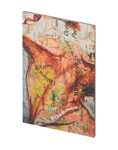
Hometown: Haddon Heights, New Jersey.
Residence: Chicago.
Job: PhD student in English at Emory University in Atlanta.
Does your job allow time to write? It often does—in that reading and researching and working through critical questions is an essential part of writing poetry for me. Though I’d have to say, I like teaching even better, because I find interacting with people (usually) more stimulating than solitary research and writing.
Time spent writing the book: Four to five years.
Time spent finding a home for it: A year and a half.
Three favorite words: Exquisite, please, future.
Dana Isokawa is the assistant editor of Poets & Writers Magazine.








